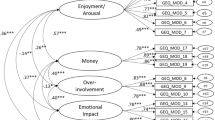Abstract
Previous research using the Gambling Outcome Expectancies Scale (GOES; Flack and Morris in J Gambl Stud, 2015. doi:10.1007/s10899-014-9484-z) revealed the instrument has excellent psychometric properties and differentially predicts gambling frequency and problem gambling scores. However, like the existing gambling motivation scales, the GOES psychometric properties and predictive utility have not been tested outside of cross sectional studies. The current study used a prospective survey design to redress this issue. Eight hundred and ninety-three participants, drawn from the general community, completed the second wave of the gambling survey. Temporal invariance testing revealed the GOES was reliable. Furthermore, the ability of the GOES to predict gambling behaviour using baseline and concurrent measures of gambling outcome expectancies was demonstrated. Specifically, consistent with the Wave 1 results, the gambling outcome expectancies that reflect diverse reasons for gambling (e.g., social, escape, and money) preferentially predicted gambling frequency whereas the narrower range of emotion focused reasons (e.g., excitement, escape, and ego enhancement) predicted gambling problems. Considered in light of the Wave 1 findings, these results underscore the need for gambling harm minimisation initiatives to take into account the emotion-oriented reasons for gambling.
Similar content being viewed by others
References
Ajzen, I. (2005). Attitudes, personality and behaviour (2nd ed.). Maidenhead: Open University Press.
Canale, N., Santinello, M., & Griffiths, M. D. (2015). Validation of the reasons for gambling questionnaire (RGQ) in a British population survey. Addictive Behaviors, 45, 276–280. doi:10.1016/j.addbeh.2015.01.035.
Chen, F. F. (2007). Sensitivity of goodness of fit indexes to lack of measurement invariance. Structural Equation Modeling, 14(3), 464–504. doi:10.1080/10705510701301834.
Clarke, D., Tse, S., Abbott, M. W., Townsend, S., Kingi, P., & Manaia, W. (2007). Reasons for starting and continuing gambling in a mixed ethnic community sample of pathological and non-problem gamblers. International Gambling Studies, 7(3), 299–313. doi:10.1080/14459790701601455.
Currie, S. R., Hodgins, D. C., Casey, D. M., & el-Guebaly, N. (2012). Examining the predictive validity of low-risk gambling limits with longitudinal data. Addiction, 107(2), 400–406. doi:10.1111/j.1360-0443.2011.03622.x.
Dechant, K. (2014). Show me the money: Incorporating financial motives into the gambling motives questionnaire. Journal of Gambling Studies, 30(4), 949–965. doi:10.1007/s10899-013-9386-5.
Dechant, K., & Ellery, M. (2011). The effect of including a monetary motive item on the Gambling Motives Questionnaire in a sample of moderate gamblers. Journal of Gambling Studies, 27(2), 331–344. doi:10.1007/s10899-010-9197-x.
Delfabbro, P., King, D., & Griffiths, M. (2014). From adolescent to adult gambling: an analysis of longitudinal gambling patterns in south Australia. Journal of Gambling Studies, 30(3), 547–563. doi:10.1007/s10899-013-9384-7.
Ferris, J., & Wynne, H. (2001). The Canadian Problem Gambling Index: Final report. Ottawa, ON: Canadian Centre on Substance Abuse.
Flack, M., & Morris, M. (2015). Problem gambling: One for the money…? Journal of Gambling Studies,. doi:10.1007/s10899-014-9484-z.
Francis, K. L., Dowling, N. A., Jackson, A. C., Christensen, D. R., & Wardle, H. (2014). Gambling motives: Application of the reasons for gambling questionnaire in an Australian Population Survey. Journal of Gambling Studies,. doi:10.1007/s10899-014-9458-1.
Gregory, R. J. (2015). Psychological testing: History, principles, and applications (7th ed.). Essex: Pearson Education Limited.
Kline, R. B. (2011). Principal and practice of structural equation modeling (3rd ed.). New York: Guilford Press.
Lambe, L., Mackinnon, S., & Stewart, S. (2014). Validation of the gambling motives questionnaire in emerging adults. Journal of Gambling Studies,. doi:10.1007/s10899-014-9467-0.
LaPlante, D. A., Nelson, S. E., LaBrie, R. A., & Shaffer, H. J. (2008). Stability and progression of disordered gambling: Lessons from longitudinal studies. Canadian Journal of Psychiatry, 53(1), 52–60.
Moore, S. M., & Ohtsuka, K. (1999). Beliefs about control over gambling among young people, and their relation to problem gambling. Psychology of Addictive Behaviors, 13(4), 339–347. doi:10.1037/0893-164X.13.4.339.
Stewart, S. H., & Zack, M. (2008). Development and psychometric evaluation of a three-dimensional Gambling Motives Questionnaire. Addiction, 103(7), 1110–1117. doi:10.1111/j.1360-0443.2008.02235.x.
Tabachnick, B. G., & Fidell, L. S. (2013). Using multivariate statistics (6th ed.). Boston: Pearson Education.
Vandenberg, R. J., & Lance, C. E. (2000). A review and synthesis of the measurement invariance literature: Suggestions, practices, and recommendations for organizational research. Organizational Research Methods, 3(1), 4–70. doi:10.1177/109442810031002.
Author information
Authors and Affiliations
Corresponding author
Rights and permissions
About this article
Cite this article
Flack, M., Morris, M. The Temporal Stability and Predictive Ability of the Gambling Outcome Expectancies Scale (GOES): A Prospective Study. J Gambl Stud 32, 923–933 (2016). https://doi.org/10.1007/s10899-015-9581-7
Published:
Issue Date:
DOI: https://doi.org/10.1007/s10899-015-9581-7




